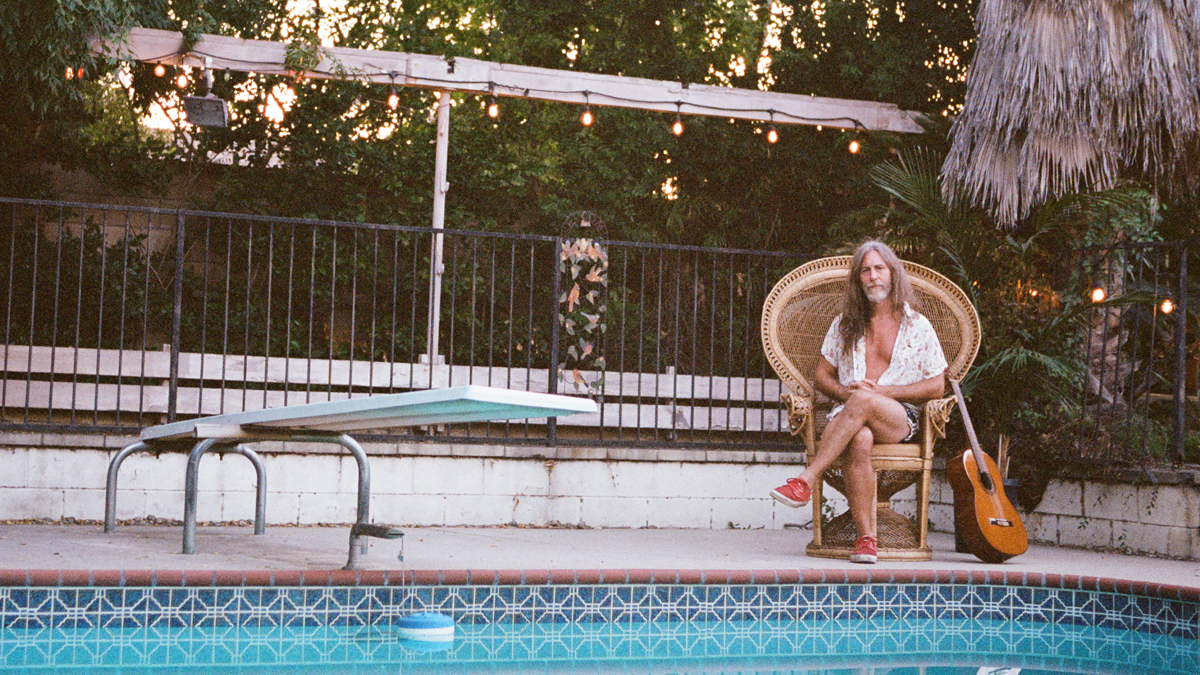Pink Mountaintops’ Stephen McBean: “There are a lot of tones on this record where I might have been like 'yuck' before, but now I like it”
The psych-rock mainstay on his newfound love of Charvels, balancing Black Mountain and Pink Mountaintops, and jamming with J. Mascis

While seemingly psychedelic in nature, Peacock Pools – the title to Stephen McBean’s latest Pink Mountaintops album – was a pragmatic choice.
The guitarist primarily recorded the album at a 1950s-era rancher in Arcadia, California that he moved into in early 2020 – there’s an unheated pool in his backyard; he swims laps in it. The neighborhood is likewise teeming with wild peacocks, which often stroll through his lawn on-leave from a nearby arboretum.
Though clearly inspirational to McBean, the Pink Mountaintops bandleader notes that his extravagantly-plumed guests don’t make for the most captive of audiences.
“They come into the backyard, [but] they’re more interested in food than music,” he says with a laugh. “Maybe they just like a different style of music than I play.”
That said, Peacock Pools is the most sonically diverse collection from the long-running Pink Mountaintops yet. While Lights of the City crunges into a Sunset Strip sleaze akin to satellite stoners Black Mountain’s last full-length, 2019’s Destroyer, Peacock Pools likewise reflects McBean’s interest in synth-riddled post-punk (Muscles), azure-tinted acoustic balladry (The Walk – Song for Amy), and fuzz-crushed, funkified noodling (Shake the Dust).
The record begins by recontextualizing the primordial hardcore of Black Flag’s Nervous Breakdown as a vampy, blues-brushed shuffle. Later, McBean works a breakneck pace on Peacock Pool’s penultimate All This Death Is Killing Me, recalling his time blasting off with Vancouver Island teen hardcore outfit Jerk Ward and cult crossover act Mission of Christ in the 1980s.
Part of Peacock Pools’ especially esoteric nature boils down to the fact that McBean was experimenting with tone while setting up his new home studio. He also credits getting let go by long-time label Jagjaguwar during the making of the album as a factor (Peacock Pools was ultimately picked up by ATO Records, which issues the album on May 6).
Get The Pick Newsletter
All the latest guitar news, interviews, lessons, reviews, deals and more, direct to your inbox!
McBean explains: “It was like going back to the first Pink Mountaintops record, or the first Black Mountain, where it was like, ‘OK, there’s no label… I’m completely making this for myself.’ I think it freed up that sprit of pushing things – from thrash metal, to industrial, to the ballads.”
Speaking with Guitar World, McBean further dove into the expansive sound of Pink Mountaintops’ most “out-there guitar record”, linking up with the Melvins’ dream-team rhythm section of bassist Steven McDonald and drummer Dale Crover for its most crushing cuts, and his newfound affinity for hot pink shredder guitars.
It’s been eight years since Pink Mountaintops’ last record, Get Back, though you’d released a pair of Black Mountain albums in between. Did you earmark riffs for Pink Mountaintops along the way, or is this a pretty fresh batch of songs?
“This one really got started [after] I moved in here [in 2020]. There’s a big garage that I was going to try and set up a studio in, but I realized I’d have to do a lot of construction that was out of my budget, so I set up in one of the bedrooms. I needed something that I wouldn’t fuss over as I was setting up my recording rig, so I recorded the Black Flag cover.
“I saw that my friend [and drummer] Ryan Jewell was holed up in Columbus, Ohio with a similar [home-recording] situation, [so] I was like, 'Hey, how’s it going? Weird world! You want to record on this Black Flag cover for shits and giggles?' Then I realized [former Black Mountain drummer] Josh Wells was in lockdown [and available to record remotely], and I managed to talk to Steven McDonald, who said, 'All my tours got cancelled… If you’re working on anything, throw it my way.' I just started sending stuff around.
The whole making of this recording was intertwined with watching recording tutorials on YouTube
“I didn’t really have a plan for a record. Some of the songs on the new record are literally just me [setting up my home studio]. Muscles is me trying to sync my new Moog Sub 37 with my LinnDrum, but songs like Nikki Go Sudden are ones I’ve had for a long time. Once I started sensing that there was a new record there, that’s when I started diving into the old demos.”
Since Nervous Breakdown starts off the record, can you get into bringing that kind of a bluesy, acoustic shuffle to a first wave hardcore classic?
“I’m terrible at covers. I can’t remember the words unless it was a song [I was listening to] when I was 13 – I know all the lyrics to Void or S.O.A., but I can’t remember anything else. [The Nervous Breakdown cover] was just because I was playing acoustic on the couch one day. I think I might’ve done one of those one of those early pandemic, positive Instagram videos when everyone was like, 'We’re in this together! We’re all going to do creative things and share with each other, and we’ll be out of this in three weeks.'
“I don’t know if you’d call it funny or ironic, but I sent that version to Steven McDonald, and I guess when he was touring with OFF! he used to play a funny disco version of Nervous Breakdown at soundcheck to annoy [former Black Flag vocalist] Keith Morris. That bassline fit [the Pink Mountaintops’] version.”
On the album cover you’re sitting outside of your place surrounded by this coterie of gear – your Les Paul, the beat-up acoustic, a Silverface of some sort, maybe there’s a Roland Space Echo on top of that. How much of that gear made it onto the record?
“Oh, all of it is on there. A lot of Les Paul. I think that’s a Fender Twin [on the cover]. There’s a lot of the LinnDrum. There’s lot of Space Echo and Echoplex on there. I mean, the whole making of this recording was intertwined with watching recording tutorials on YouTube. I was learning about phase, and other things. A lot of it was just a way to kill time.”
Out of those YouTube tutorials, which was the most impactful to Peacock Pools?
“There were some interesting ones on ducking reverb or dynamic EQ-ing. I also ordered a DVD of singing lessons; I had never analyzed [my] singing before. It was like going back to school while making a record.”

Can you get into the solo on the new record’s Blazing Eye? The song’s pretty much an echo-plated, synth-and-drum-machine-driven creeper, but the guitar lead at the end of the song is super-piercing and painful…
“I know that I used a lot of the Screaming Bird treble boost, which sounds really nice when you’re blazing up a Marshall; it adds some top harmonics. Some of my favourite guitar sounds are direct ones, though, where we have a crazy chain of pedals going into an overdriven pre-amp.
“[Blazing Eye] was a song that I tried recording for Black Mountain’s Destroyer, but [back then] it was acoustic-based – almost going for a slightly proggy, Pretty Things kind of vibe. When I was looking for songs [for Peacock Pools], I came [across] that demo; [By then I was] obsessed with the first song on Gary Numan’s I Assassin, White Boys and Heroes.
“I did [this version] with the LinnDrum and the Sub 37 synths sitting there; I sent that to Ryan Jewell and he added all that weird egg shaker shit. I wasn’t even going to put guitars on it, but at the last moment I decided to do some bright, Roland S. Howard [circa] The Birthday Party [noise]. I might’ve used a J. Mascis Jazzmaster for that. It was definitely going through the Echoplex for some tape delay.”
Lights of the City feels like it could have been a Black Mountain song, as well. How do you ultimately decide what becomes part of one project, and not the other?
“With the first two records [2004’s Pink Mountaintops and 2005’s Black Mountain] there are songs that could have gone either way – No Satisfaction from the first Black Mountain Record could have been on the first Pink Mountaintops record.
“I guess the riffier stuff or lyrics about demons and wizards float to the Black Mountain side, while some of the more tearful, heart-on-a-sleeve stuff goes to the Pink side. But, actually, Lights of the City, All This Death Is Killing Me, The Walk – Song for Amy and Miss Sundown might’ve been earmarked for Black Mountain. Miss Sundown was actually recorded for Destroyer, too, [but as] a really slow, pastoral, early Pink Floyd kind-of folk thing. I had that group of songs, and I asked Steven McDonald, ‘you think [Melvins drummer] Dale Crover would want to play on some stuff,’ which seemed like a dream.
“I booked the time at this place in L.A. called Valentine Studios. It’s beautiful, almost like a time capsule. All these people recorded there from the ‘50s to the ‘60s, from Bing Crosby to the Beach Boys. In the early ‘80s when all the hair metal stuff came in, the guy that owned it – who was the engineer at the time–hated that kind of music [so] he got into cars. He opened a vintage car restoration [business] on the same property. Apparently, the studio sat untouched for 20 years. The magazines on the table are recording magazines from 1967. It’s like a Mad Men set, but it’s legit.
For All This Death Is Killing Me, I’d just gotten this pink Charvel, which I really like – I’ve never had a shredder guitar before
“Anyways… I booked the time but was like, 'Fuck…I’m not writing anything [new]' so I went back and found Lights of the City and those other ones [to record with McDonald and Crover]. With All This Death is Killing Me, one day I was feeling bummed about some friends that weren’t around any more, so I wrote this thrash song just for fun. Then I was like, 'Who better to record that with than these guys?'”
The double time, d-beat hardcore pulse of All This Death Is Killing Me is an extreme pivot for Pink Mountaintops, but it also plays true to your roots in punk and metal bands like Jerk Ward and Mission of Christ. What can you say about presenting that kind of full-steam-ahead fury through the lens of this particular project?
“Once I had a few songs together it kind of made sense to just go all over the place with it, like a mixtape or soundtrack. I liked having [All This Death Is Killing Me] right before the mellowest tune [The Walk – Song for Amy].”

With respect to the out-of-control solo on All This Death Is Killing Me – that wah-buried, pinch-and-dive section – was that off the cuff or sculpted?
“All the solos are pretty go-for-it, whether it’s fast or slow, [though] I do a bunch of passes. It’s usually the first or second take [that gets used]. The more you focus in on it, the more heart you lose, you know?
“For that one, I’d just gotten this pink Charvel, which I really like – I’ve never had a shredder guitar before. I wrote a million riffs on it when I was in the store, so it was like, 'I have to get this.' It’s not a high-end Charvel, but it has split-coil pickups and a bunch of weird shit that I’ve never had before; that added that ‘80s [feel].
“I think it’s on Lights in the City, the clean stuff where it’s this real chime-y, compressed [texture]. There are definitely a lot of tones on this record where I might’ve been like 'yuck' before, but now I like it.”
Pink Mountaintops recently came off a tour with Dinosaur Jr. – had you known J. Mascis and Lou Barlow back in the early ‘80s when they were still in Deep Wound? They’d mentioned over the years that they were fans of the Neos [a Victoria, BC hardcore band whose members later joined McBean in Mission of Christ], but had you personally been in contact with them back then?
“Jerk Ward’s drummer, John [London], had the Deep Wound 7-inch, so we were super-into them. It’s funny, when I went out to my parents last Christmas there was this box there of my old stuff. There was a small amount of my little fanzine, and there was actually a Deep Wound review in an issue that never came out. It said: ‘The weirdest thing is that the drummer [J. Mascis] plays a guitar solo on one song, and it’s really good!’ I didn’t find out [Dinosaur Jr.] was the same people until the early ‘90s – through a Spin magazine review, I think.
J. Mascis will hear something and say, 'that sounds like [you’re using] a weird speaker cord instead of a patch cord,' and I’ll be like, 'You can hear that?' He’s not as aloof as he seems
“It’s nice to have become pretty close friends with J. and Lou, but they were pen-pals with the Neos [back then]. One of them wrote to [Neos bassist/Mission of Christ guitarist] Kev [Smith], and one of them wrote to Steve [Bailey] from the Neos. It’s pretty neat that there’s that connection there.”
What was the name of your fanzine?
“It was called Verbal Assault – it pre-dates the band Verbal Assault. I don’t know if that’s where they got the name, but I ran it from ’82 to ’84.”
Have you ever shredded it up with J., even at a soundcheck?
“I have! I played Raisans with them in New York at their 30th anniversary show [in 2015]. I played guitar and sang it; it’s my favourite Dinosaur Jr. song. That was fun, and slightly surreal.
“[J.’s] got really high action. When you pick up his guitars, you’re like, 'That’s pretty high up there' [laughs]. He’s really good to talk to about gear and shit; he’s a gear genius. He’ll hear something and say, 'that sounds like [you’re using] a weird speaker cord instead of a patch cord,' and I’ll be like, 'You can hear that?' He’s not as aloof as he seems.”
Gregory Adams is a Vancouver-based arts reporter. From metal legends to emerging pop icons to the best of the basement circuit, he’s interviewed musicians across countless genres for nearly two decades, most recently with Guitar World, Bass Player, Revolver, and more – as well as through his independent newsletter, Gut Feeling. This all still blows his mind. He’s a guitar player, generally bouncing hardcore riffs off his ’52 Tele reissue and a dinged-up SG.
“Among the most sought-after of all rhythm guitars… a power and projection unsurpassed by any other archtop”: Stromberg has made a long-awaited comeback, and we got our hands on its new Master 400 – a holy grail archtop with a price to match
“It combines unique aesthetics with modern playability and impressive tone, creating a Firebird unlike any I’ve had the pleasure of playing before”: Gibson Firebird Platypus review














